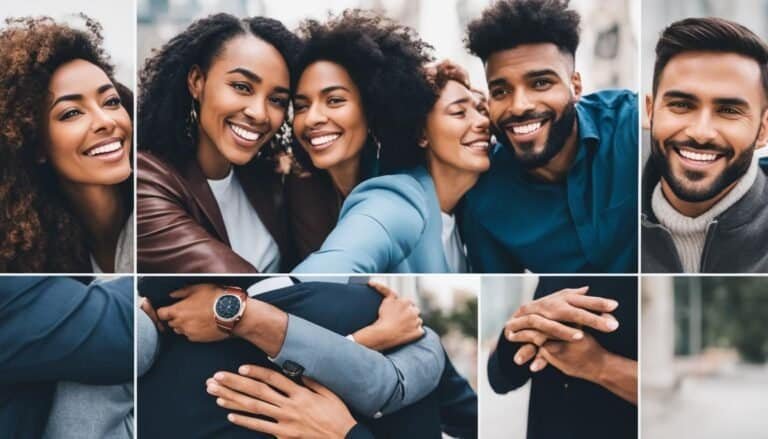What Your Social Media Usage Reveals About Your Personality
Your social media usage reflects your personality traits. Extroverts tend to be more active, while introverts value privacy. Selfie-centric posts might indicate narcissistic tendencies, influencing relationships. Think before impulsively engaging online to avoid negative repercussions. Social media addiction can signify deeper personality issues affecting real-life connections. Comparing yourself online may affect self-esteem, but boosting confidence is essential. Therapy can aid in managing personality disorders surfacing in social media behavior. Upholding values through respectful online interactions shapes your digital persona. Emotional intelligence guides relationships and conflict resolution on social media. Authenticity online attracts genuine connections. Understanding these connections can reveal more about your inner self.
Key Takeaways
- Extroverts are more active in social media interactions, seeking engagement.
- Introverts prefer digital privacy and have unique communication preferences.
- Narcissistic tendencies may manifest in attention-seeking behaviors and selfie culture online.
- Impulsive online interactions can impact relationships negatively.
- Social media addiction can reflect underlying personality traits and affect real-life engagements.
Social Media Usage and Extroversion
Have you ever wondered how your level of extroversion influences your social media usage patterns?
Extroverts tend to thrive on social interactions, seeking out opportunities for engagement and connection. This trait often translates into active online networking and frequent virtual socializing. For extroverted individuals, social media serves as a platform to expand their social circles, share experiences, and maintain relationships.
Extroverts are more likely to post frequently on social media platforms, sharing updates about their lives and engaging with others through comments and messages. They enjoy the interactive nature of social media, using it as a tool for staying connected with a wide range of friends and acquaintances. Virtual socializing provides extroverts with a way to express themselves, seek validation, and seek out new social opportunities.
In essence, extroversion plays a significant role in shaping how individuals navigate the digital landscape of social media. For extroverts, online platforms offer a space for social expression and connection, reflecting their natural inclination towards social interactions.
The Impact of Social Media on Introverts
Exploring the world of social media as an introvert can pose unique challenges and opportunities for personal growth and self-expression. Introverts, known for their preference for solitude and reflection, often approach social media differently than extroverts. Communication preferences play a significant role in how introverts engage online. Social media platforms offer introverts a space to express themselves without the pressure of face-to-face interactions. Through carefully crafted posts or comments, introverts can share their thoughts and feelings in a controlled manner, allowing them to articulate ideas more effectively.
Digital privacy is another vital aspect for introverts navigating social media. Introverts tend to be more selective about sharing personal information online, valuing their privacy and boundaries. They may prefer smaller, more intimate online interactions rather than broadcasting their lives to a wide audience. Maintaining a sense of control over their digital footprint is essential for introverts to feel comfortable and secure in their online interactions. By understanding and respecting these communication preferences and digital privacy needs, social media can become a valuable tool for introverts to connect, express themselves, and cultivate meaningful relationships in their own unique way.
Narcissism and Social Media Behavior
When using social media, you may notice patterns of narcissism in the way people present themselves through selfies, seeking attention, and craving validation through likes. These behaviors can indicate a desire for external validation and a focus on self-image rather than genuine connection.
Understanding these tendencies can shed light on how social media platforms can both amplify and reflect certain aspects of our personalities.
Narcissism in Selfies
In today's digital age, the prevalence of selfies on social media platforms has sparked a growing interest in understanding the relationship between narcissism and self-presentation.
Selfie culture often revolves around seeking validation and building an online image that reflects self-worth. Individuals may use selfies as a means to boost their self-esteem or project a specific image to the world. However, excessive posting of selfies with a focus on physical appearance can sometimes indicate narcissistic tendencies.
It's crucial to strike a balance between sharing self-portraits for self-expression and ensuring that self-worth isn't solely dependent on external validation. The way one engages with selfies can offer insights into their perception of themselves and their interactions in the digital domain.
Attention-Seeking Behavior
The prevalence of attention-seeking behavior on social media platforms often correlates with narcissistic tendencies, reflecting individuals' desire for validation and recognition in the digital domain. This validation-seeking behavior can manifest in various forms, such as constantly posting self-promotional content or meticulously crafting a desirable image online.
When you find yourself engaging in attention-seeking actions on social media, it might stem from a deep-seated need for external validation and admiration. By seeking attention through likes, comments, and shares, you may be trying to fill a void or boost your self-esteem.
It's essential to reflect on whether your online behavior is genuinely reflective of your authentic self or if it's a carefully curated facade aimed at garnering attention.
Validation Through Likes
Engaging in validation-seeking behaviors through likes on social media can often reveal underlying narcissistic tendencies and a desire for external affirmation and recognition. Seeking validation in the form of likes may stem from a lack of intrinsic self-worth, leading individuals to rely on external approval to feel valued. This behavior can have a significant impact on mental health, as the constant need for validation through likes can perpetuate feelings of inadequacy and dependency on others for self-esteem. It is essential to recognize the underlying reasons for seeking validation online and work on building self-worth internally. Here is a table illustrating the potential impact of seeking validation through likes on social media:
| Negative Effects | Positive Effects | Strategies to Cope |
|---|---|---|
| Decreased self-esteem | Temporary confidence boost | Limit social media use |
| Comparison to others | Feeling of validation | Practice self-affirmations |
Impulsivity in Online Interactions
Exploring the fast-paced world of social media can sometimes lead to impulsive behaviors during online interactions. Impulsive reactions in online behavior can stem from the immediacy of communication platforms, where responses can be instantaneous. This impulsivity can manifest in various ways, such as hastily posting comments without fully considering their impact or engaging in heated debates without taking a moment to reflect.
When you find yourself reacting impulsively online, it's crucial to pause and consider the implications of your words or actions. Reflect on whether your response aligns with your true intentions and values. Remember that online interactions, even though they may feel fleeting, can have lasting effects on your relationships and reputation.
Developing mindfulness and self-awareness in your online behavior can help you navigate social media more thoughtfully and build more meaningful connections.
Social Media Addiction and Personality Traits
Impulsive online behaviors can sometimes lead to deeper issues, such as social media addiction, which is often intertwined with specific personality traits. Social media addiction can manifest through excessive time spent online, constant checking for updates, and prioritizing virtual interactions over real-life engagements. Individuals with addictive tendencies may use social media as a way to escape reality, seek validation, or cope with stress, contributing to the development of this behavior.
Your online identity can become closely tied to social media addiction, as the digital world offers a platform to curate a persona that may differ from your true self. This discrepancy between online and offline personas can exacerbate feelings of loneliness, anxiety, or inadequacy, further fueling addictive digital behaviors. Recognizing the impact of your online actions on your mental well-being is essential in addressing social media addiction and understanding how specific personality traits may influence your relationship with social platforms.
Relationship Between Social Media and Self-Esteem
When scrolling through social media, you may find that your self-esteem can be influenced by what you see. Comparing yourself to others online can sometimes lead to feelings of inadequacy or insecurity.
Understanding how social media impacts your self-esteem can help you navigate these platforms more mindfully.
Self-Esteem Impact
The relationship between social media usage and self-esteem is a complex and influential aspect of modern psychological research. Your self-esteem impact on mental health is significant; constant comparison on social media can lead to feelings of inadequacy and lower self-worth.
Coping mechanisms become important in dealing with these challenges. Engaging in positive self-talk, limiting time spent on social platforms, and focusing on real-life connections can help lessen the negative effects on self-esteem. Recognizing that social media often presents a curated version of reality can aid in building a healthier self-image.
Social Comparison Effects
Constantly comparing yourself to others on social media can greatly impact your self-esteem. Social comparison anxiety arises when you measure your self-worth against others based on their social media posts.
The constant exposure to curated and often idealized versions of others' lives can lead to negative self-image evaluation. It's essential to remember that what people choose to showcase online is just a fraction of their reality. Acknowledging this can help in reducing the detrimental effects of social comparison on your self-esteem.
Engaging in activities that boost self-confidence and limit the time spent on social media comparison can be beneficial. Remember, your value isn't determined by the highlights you see on social media.
Personality Disorders and Social Media Patterns
In examining the relationship between personality disorders and social media patterns, it becomes evident that certain behaviors on social platforms can reflect underlying psychological complexities.
For individuals grappling with personality disorders, social media can serve as both a pivotal and a double-edged sword. Some may find solace in the anonymity and perceived control social media offers, using it as a platform to express themselves freely without the constraints they might face in real-life interactions. However, this can also lead to a reinforcement of maladaptive patterns and behaviors.
Therapy can play an essential role in helping individuals with personality disorders navigate social media in a healthier manner. Therapists can work with clients to develop strategies to recognize and address negative thought patterns and behaviors that may be perpetuated or triggered by social media use.
Social Media as a Reflection of Values
When engaging on social media, your values often shape your online interactions, influencing the content you share and the causes you support.
The tension between authenticity and perception becomes evident as you navigate how much of your true self to reveal and how you want to be perceived by others in the digital domain.
Understanding how your values manifest in your online presence can offer insights into your priorities and beliefs, shedding light on the intricate relationship between your virtual and real-life personas.
Values in Online Interactions
Reflecting the values we hold dear, social media serves as a mirror of our beliefs, attitudes, and principles in the digital domain. Online ethics play an essential role in shaping how we interact with others online.
Your behavior on social media platforms can reveal a lot about your ethical standards and the importance you place on honesty, respect, and integrity in your online interactions. Upholding digital boundaries is another aspect that reflects your values in online interactions.
How you navigate privacy settings, handle sensitive information, and respect the boundaries set by others can demonstrate your consideration for others' feelings and your commitment to creating a safe and respectful online environment.
Authenticity Vs. Perception
Social media acts as a mirror reflecting the dichotomy between authenticity and perception, showcasing how individuals navigate the balance between presenting their true selves and shaping a desired image online. In this digital landscape, self-awareness exploration becomes important as users grapple with the question of how much of their genuine selves they reveal and how much they tailor for perception management.
Aspiring for authenticity while managing perceptions can be a delicate dance, often influenced by societal norms, peer pressure, and personal insecurities. The online world offers a platform for individuals to express themselves, but it also poses the challenge of maintaining a consistent image that aligns with both internal values and external expectations. This tension between authenticity and perception highlights the complexity of human nature in the digital age.
Social Media and Emotional Intelligence
Understanding the impact of emotional intelligence on your social media interactions can provide valuable insights into your online relationships and communication style. Emotional intelligence assessment tools can help you recognize how well you understand and manage your emotions, which in turn affects how you engage with others on social platforms. Here are some key points to take into account:
- Empathy and Connection: Emotional intelligence is linked to your ability to empathize with others. This trait can influence how you respond to posts, comments, and messages from friends and followers.
- Conflict Resolution: Higher emotional intelligence levels are associated with better conflict resolution skills. This can reflect in how you handle disagreements or negative interactions on social media.
- Self-Awareness: Understanding your own emotions and triggers can help you navigate social media more effectively. It can also impact the content you choose to share and the way you present yourself online.
- Communication Style: Emotional intelligence can shape your communication style online, influencing the tone, language, and overall effectiveness of your messages.
Authenticity Vs. Social Media Persona
In the world of social media, the balance between presenting your authentic self and crafting a persona can greatly impact your online interactions and relationships. Identity expression plays an important role in how you navigate the digital landscape. Striking the right balance between authenticity and persona can determine the level of trust and connection you establish with your online audience.
Online authenticity is about being true to yourself while adapting to the norms and expectations of different online platforms. It involves showcasing your genuine thoughts, feelings, and experiences in a way that feels comfortable to you. However, the pressure to conform to certain trends or portray a specific image can sometimes lead to a disconnect between your real self and your online persona.
Finding a middle ground where you can express your identity authentically while also engaging with the social media environment can help you build more meaningful connections. Remember that being true to yourself online can foster genuine relationships and attract like-minded individuals who appreciate your authenticity.
Conclusion
Based on your social media usage, it's clear that your personality shines through online. Remember, 71% of people admit to comparing themselves to others on social media, leading to feelings of inadequacy.
Understanding how your behavior reflects your personality can help you navigate the digital world with authenticity and self-awareness. Embrace your uniqueness and use social media as a tool for self-expression, rather than a platform for comparison.








